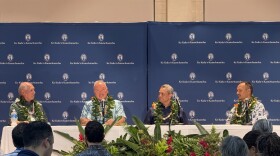-
Musician and kumu hula Robert Cazimero spoke to The Conversation’s Catherine Cruz about the opening of the exhibit honoring his life and legacy, “Ke Kilo Lani.”
-
The annual march comes amid military lease negotiations and a legal challenge to Kamehameha Schools’ admission policy which gives preference to Native Hawaiians.
-
Five decades ago, a group of Hawaiian activists landed on Kahoʻolawe in an attempt to stop the U.S. military’s bombing of the island. HPR’s Catherine Cluett Pactol sat down with Molokaʻi’s Walter Ritte and shares his memories of that decisive movement.
-
Alice Christophe, curator for Oceania at the British Museum, spoke with The Conversation’s Catherine Cruz about a special show highlighting Hawaiʻi's history and its diplomatic relationship with Great Britain.
-
Kamehameha Schools student Kalamakū Crabbe spoke to The Conversation's Catherine Cruz about her Kahoʻolawe documentary, which won second in a National History Day competition.
-
The cast and crew of "The Return of Kapaemahu" spoke to The Conversation's Catherine Cruz as the free hula show at the Kūhio Beach Hula Mound in Waikīkī comes to a close.
-
TJ Tario, who performs under the stage name Laritza, spoke with HPR’s Maddie Bender about winning the talent show "Hawaiʻi to the World" and headlining the upcoming Wayfind Music Festival.
-
Three finalists for Kamehameha Schools trustee were announced earlier this month, and whoever the Hawai‘i Probate Court picks will help govern the largest charitable trust in the state.
-
The first annual Nā Pua Mele O Hawaiʻi Song contest, hosted by Mana Maoli, brought in nearly 70 high school applicants from across the state and country.
-
A state board that oversees inoa ʻāina, or Hawaiian place names, has voted to change the official name of Hawaiʻi Island.
Play Live Radio
Next Up:
0:00
0:00
Available On Air Stations










